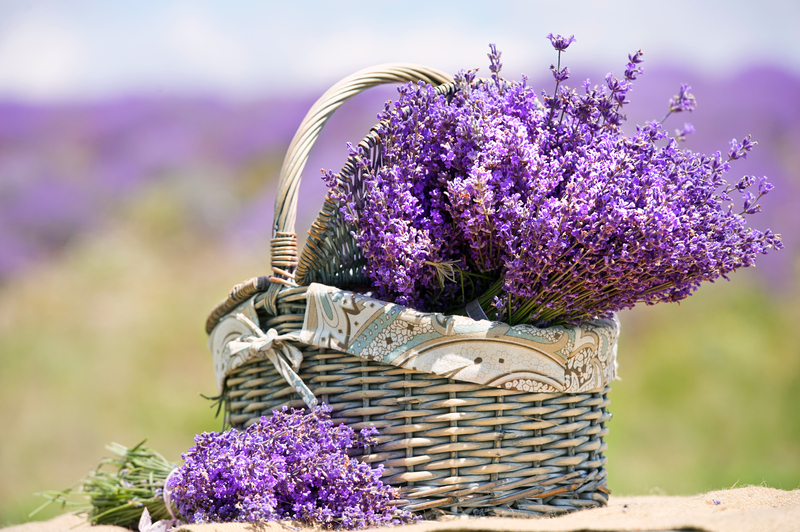Fast-Growing Plants to Perfect Your Privacy Screen
Posted on 05/06/2025
Fast-Growing Plants to Perfect Your Privacy Screen
Are nosy neighbors or busy roads disrupting your peace and privacy? Creating a living privacy screen with fast-growing plants is a beautiful and eco-friendly way to solve these issues while enhancing your yard's visual appeal. In this comprehensive guide, you'll discover the best fast-growing plants for privacy, their care requirements, and tips for creating the ultimate natural barrier in your garden.
Why Choose Fast-Growing Plants for Your Privacy Screen?
Natural privacy barriers offer more than just separation from prying eyes. Living screens provide a lush green look, absorb noise, purify air, shelter wildlife, and can even increase your property value. Picking quick-growing plants ensures you won't have to wait years for the coverage you need. Here's why rapidly maturing plants are an excellent choice:
- Quick results: Enjoy dense coverage in as little as one to two seasons.
- Cost-effective: Fewer plants are needed when they fill in gaps quickly.
- Aesthetic flexibility: Choose from diverse shapes, sizes, and foliage.
- Environmentally friendly: Living screens reduce energy bills and provide habitats for birds and pollinators.

Top Fast-Growing Plants for Privacy Screens
Let's explore the best fast-growing plants for privacy screening across different climates and spaces. Whether you want towering evergreens, vibrant flowering shrubs, or even edible barriers, you'll find the perfect fit below.
Bamboo: The Iconic Quick-Grower
Bamboo tops many lists for privacy screens due to its speed, height, and graceful appearance. Certain clumping bamboo varieties can grow up to 3 feet per year and reach over 20 feet high!
- Advantages: Dense, evergreen foliage; minimal maintenance; ideal for narrow spaces
- Best types: Fargesia (clumping, non-invasive), Phyllostachys (running, but can be invasive)
- Care tips: Use root barriers for running varieties; prefers well-draining soil and moderate watering
Note: Avoid invasive bamboo unless you have containment measures.
Arborvitae (Thuja) - The Privacy Mainstay
Arborvitae, especially Thuja Green Giant, is revered for its towering form and rapid growth--up to 5 feet per year under the right conditions. Its tight, pyramidal structure offers an impenetrable, lush green wall.
- Advantages: Winter-hardy, evergreen, disease resistant
- Best types: Green Giant, Emerald Green
- Care tips: Full sun to partial shade, regular watering until established
Privet (Ligustrum): A Classic for Formal Hedges
Privet hedge options, such as Japanese Privet, California Privet, and Amur Privet, are renowned for their adaptability and speed. They can gain 2-3 feet annually, forming tight hedges perfect for shaping.
- Advantages: Tolerates trimming for formal or informal looks
- Best types: Ligustrum japonicum, Ligustrum vulgare
- Care: Prune regularly, suits a wide range of soils, sun or partial shade
Cherry Laurel (Prunus laurocerasus): Beautiful Evergreen Barrier
The Cherry Laurel grows fast (2-3 feet per year) and forms a dense, shiny-leaved evergreen wall ideal for privacy and blocking noise. Its attractive white flower spikes in spring add beauty to function.
- Advantages: Shade tolerant, evergreen, attractive blossoms
- Care: Prefers moist but well-drained soil, prune to maintain shape, drought-tolerant once established
Willow Hybrid: The Speed King
If you need instant privacy, Willow Hybrids (Salix x matsudana x alba) are hard to beat, growing up to 10 feet per year and reaching heights of 30-40 feet at maturity.
- Advantages: Extremely fast-growing, highly adaptable, windbreak qualities
- Care: Thrives in full sun; handles wet soils well
- Note: Roots can be invasive; plant away from foundations or pipes
Red-Tipped Photinia: Colorful and Fast
This striking Red Tip Photinia shrub features brilliant red new growth, white blossoms in spring, and reaches 10-15 feet tall, adding vibrant interest and privacy to your landscape.
- Advantages: Showy color, dense form, fast growth (2-3 feet annually)
- Care: Needs good air circulation to avoid fungal issues; full sun preferred
Wax Myrtle (Myrica cerifera): Fragrant, Tough, and Quick
Wax Myrtle is prized in coastal and southern climates for its aromatic leaves, drought resistance, and swift growth up to 5 feet per year.
- Advantages: Tolerates poor soils, salt spray, and drought
- Care: Prefers full sun to part shade, adaptable to various soils
Cypress (Leyland Cypress): Reaching New Heights
Leyland Cypress is a top pick for fast-growing privacy screens. With its dense, feathery foliage, it can shoot up by an impressive 3-4 feet per year.
- Advantages: Evergreen, easy to shape, deer-resistant
- Care: Needs full sun, regular watering as it establishes
- Note: Requires space--plant 6-10 feet apart for best results
Fast-Growing Flowering Shrubs for Privacy
- Forsythia: Renowned for its golden spring blooms and 2-foot annual growth, it makes a cheerful living fence.
- Rose of Sharon: Tall, vase-shaped shrub with stunning summer flowers. Grows quickly to 12 feet and can be pruned as a hedge.
- Oleander: For warmer climates, oleander produces showy blossoms and rapid growth, while tolerating salt and drought.
Edible Fast-Growing Hedges
Want a privacy screen that pays you back? Consider planting fast-growing edible hedges like:
- Blackberries: Vigorous cane growth, dense coverage, and delicious summer berries.
- Raspberries: Spreading habit and quick foliage make excellent screens with tasty returns.
- Goji Berry: Fast-growing shrub with healthful fruits and a dense, bushy habit.
How to Choose the Right Fast-Growing Plant for Your Privacy Screen
Making the right selection depends on your unique climate, soil, available space, and desired aesthetics. Here's how to narrow down your options when planning a natural privacy hedge:
- Climate Suitability: Check your USDA hardiness zone and choose species that thrive there.
- Growth Habit: Consider how tall, wide, and dense each plant becomes at maturity.
- Maintenance Requirements: Decide how much pruning and shaping you're willing to do annually.
- Evergreen or Deciduous: Evergreens offer year-round coverage, while deciduous options may offer seasonal color.
- Root Behavior: Avoid trees and shrubs with invasive roots near utilities or foundations.
- Wildlife Value: Select species that offer berries or shelter for birds if wildlife-friendly gardening matters to you.
Planting and Growing Tips for the Ultimate Fast-Growing Privacy Screen
Getting your privacy screen off to a running start takes more than just picking fast-growing varieties. These tips ensure your natural barrier thrives quickly and beautifully:
1. Plan Before You Plant
- Measure the area to determine how many plants you'll need (factor in mature size and recommended spacing).
- Map out the location for sun/shade exposure and proximity to structures.
2. Prepare the Soil
- Amend the soil with compost to improve drainage and nutrients.
- Test the pH to match your chosen plants' needs.
3. Plant at the Right Time
- Early spring or fall planting helps roots establish before hot or cold extremes.
4. Water Wisely
- Water deeply after planting and during the first growing season.
- Mulch to retain moisture and suppress weeds.
5. Prune and Training
- Regular pruning can speed up bushiness for hedges like privet or photinia.
- Shape while young for a formal look or let grow free-form for a natural screen.
6. Fertilize for Fast Growth
- Use a slow-release balanced fertilizer in spring to jumpstart growth.
Design Inspiration: Combining Fast-Growing Plants for Layered Privacy
An effective privacy screen with fast-growing plants doesn't need to be a single row monoculture. Get creative by mixing varieties for a multicolored, multi-seasonal, and wildlife-friendly hedge.
- Underplant tall evergreens (like arborvitae or cypress) with flowering shrubs (forsythia, rose of Sharon).
- Mix deciduous and evergreen for four-season interest and coverage.
- Combine textures and leaf colors for an attractive, layered effect.

Common Questions About Fast-Growing Privacy Screens
How long will it take to establish a green privacy barrier?
With the right choices and care, many fast-growing privacy plants will form a substantial screen in 2-3 years or less.
Will these fast-growing plants work in containers?
Some, like bamboo and certain privet varieties, can thrive in large containers--perfect for patios or where in-ground planting isn't possible.
Which fast-growing privacy shrubs are best for small spaces?
Consider clumping bamboo, compact cherry laurel, boxwood, or privet for narrower hedges or tight property lines.
Are there privacy plants that also block noise?
Dense, leafy evergreens such as arborvitae, bamboo, and willow hybrid are especially effective at sound reduction, particularly when planted in staggered rows.
Conclusion: Achieve Privacy Fast, Naturally
Establishing a fast-growing privacy screen with plants is a smart, rewarding investment in your property's value, beauty, and serenity. By selecting the right species and providing good care, you can enjoy a lush, private retreat within just a couple of seasons. From towering evergreens like Thuja and Leyland cypress to mixing in colorful shrubs and edible hedges, your options are as varied as your vision. Start planting today, and soon you'll enjoy a secluded, green oasis right in your own backyard!
Ready to plant your perfect privacy screen?
Explore local nurseries, choose the right fast-growing privacy plants for your climate, and get started on your journey to creating a peaceful, beautiful, and private outdoor space!
Latest Posts
Revitalize Your Orchid Care Knowledge Base
Craft a Gorgeous Landscape with 3 Top Weed Management Tips
Transform Your Garden into a Calm Oasis Amidst Winds
Laying the Roots: 9 Beginner Tips for a Successful Gardening Adventure

